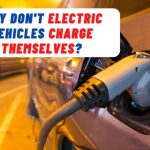Last Updated on December 13, 2022 by
Electric vehicles are becoming more and more common as the years go on. With gas prices increasing and technology improving, it’s no wonder that people are making the switch to electric.
But will these vehicles last longer than gas cars? And what kind of maintenance do they require? Here are some tips on how to keep your electric vehicle running smoothly.
What is the lifespan of an electric car?
Electric cars are increasingly becoming a popular choice for those looking for an environmentally friendly and efficient vehicle. But how long do electric cars last?
Studies have shown that the average lifespan of an electric car is around eight years or 150,000 miles, which is comparable to the average lifespan of a traditional gasoline-powered car.
However, it is important to note that electric cars require less maintenance than their gasoline-powered counterparts, so they may actually last even longer.
In addition, the batteries in electric cars are designed to last for the lifetime of the vehicle, so you won’t have to worry about replacing them every few years.
As a result, electric cars offer a compelling option for those looking for a reliable and sustainable form of transportation.
What is the life expectancy of an electric car?
Electric cars are becoming increasingly popular as consumers look for more environmentally-friendly options. But how long do these cars actually last?
On average, an electric car will have a lifespan of about 200,000 miles. This is significantly higher than the average lifespan of a gasoline car, which is only about 150,000 miles.
Of course, there are many factors that can affect the lifespan of an electric car, including how often it is driven and how well it is maintained.
However, with proper care, an electric car can easily last for over a decade. In fact, many electric cars come with warranties that cover up to 100,000 miles.
So if you’re considering making the switch to an electric car, you can rest assured knowing that it will likely serve you well for many years to come.
Do electric cars last longer than petrol?
There is a lot of debate surrounding electric cars and their longevity in comparison to petrol cars.
Petrol cars have been around for over a hundred years, and so their reliability has been well-tested.
Electric cars are a relatively new technology, and so there is less data available on how long they last.
However, there are some indications that electric cars may actually have a longer lifespan than petrol cars.
One reason for this is that electric cars have fewer moving parts than petrol cars. This means that there are fewer opportunities for something to go wrong.
In addition, electric cars tend to be better at regulating their own temperature, which helps to protect the battery from damage.
As a result, it is possible that electric cars could outlast petrol cars by a considerable margin. Only time will tell for sure whether this is the case.
Do electric cars only last 10 years?
Electric cars have been gaining in popularity in recent years, as consumers seek to reduce their environmental impact and save money on fuel costs.
However, there is a common misconception that electric cars only last for 10 years before needing to be replaced.
In reality, electric cars can last for decades if they are properly maintained. The batteries that power electric cars are designed to last for many years.
And the motors do not require the regular tune-ups that gasoline engines do. As a result, electric cars are often much more reliable than their gas-powered counterparts.
With proper care, an electric car can easily last for 20 years or more. Consequently, claims that electric cars only last for 10 years are baseless and should not deter consumers from making the switch to this more sustainable and affordable option.
How long does an electric car last on a full charge?
The answer to this question depends on a number of factors, including the type of electric car, the age of the battery, and the driving conditions.
On average, a new electric car will have a range of about 200 miles on a full charge. However, this number can drop over time as the battery starts to lose capacity.
In addition, extreme cold or heat can also affect the range of an electric car. If you’re planning to drive in winter weather, it’s important to make sure that you have enough charge to reach your destination.
Ultimately, how long an electric car lasts on a full charge is something that you’ll need to experiment with to find out what works best for you.
Do electric cars last as long as regular cars?
When it comes to electric cars, one of the most common questions is how long they last. After all, electric cars are a relatively new technology, and many people are still uncertain about their reliability.
However, studies have shown that electric cars can actually outlast regular cars by a significant margin.
One reason for this is that electric cars don’t rely on combustion engines, which are susceptible to wear and tear.
In addition, electric cars tend to have fewer moving parts than regular cars, which helps to reduce the overall number of repairs that are needed.
As a result, electric cars can provide years of trouble-free operation. With proper care and maintenance, an electric car can provide its owner with many years of efficient and environmentally-friendly transportation.
How long do electric car batteries last?
Electric car batteries are designed to last for many years, with most manufacturers offering a warranty of 8 years or more.
However, the actual lifespan of a battery will depend on a number of factors, including how it is used and maintained.
For example, if an electric car is regularly driven long distances or left idling for extended periods of time, the battery may degrade faster.
Conversely, if the battery is regularly charged and not allowed to dip below 50% capacity, it should last for many years.
In any case, electric car batteries are typically much longer lasting than traditional petrol or diesel engines, meaning that owners can enjoy years of emissions-free driving.
How long will gas cars be around?
While electric cars are becoming increasingly popular, it’s important to remember that gas cars are not going away anytime soon.
In fact, there are several factors that suggest gas cars will be around for many years to come.
- First of all, the infrastructure for electric cars is still very limited.
- There are only a handful of charging stations in most communities, which makes it difficult for people to rely solely on electric cars.
- Second, electric cars are still relatively expensive. The high initial cost means that many people will continue to opt for gas cars, at least for the foreseeable future.
- Finally, electric cars simply don’t have the same range as gas cars. This is a major drawback for families who need to travel long distances or who live in rural areas.
For all of these reasons, it’s likely that gas cars will remain a common sight on the roads for many years to come.
How long do electric cars last before charging?
Electric cars are a popular choice for many drivers, thanks to their low emissions and fuel efficiency.
But one of the main concerns about electric cars is how long the batteries will last before needing to be recharged. The good news is that most electric car batteries can last for several hundred miles before needing to be recharged.
However, this will vary depending on the make and model of the car, as well as driving conditions.
Ultimately, how often you need to recharge your electric car will depend on your driving habits and the type of car you own.
However, with proper care and maintenance, your electric car should provide years of trouble-free service.
What are the downsides to electric cars?
First of all, electric cars are more expensive than traditional gasoline cars. The initial cost may be higher, and the batteries need to be regularly replaced, which can add up over time.
Additionally, electric cars require a reliable and robust infrastructure of charging stations. Without a convenient place to charge, electric car owners may find themselves stranded far from home.
Finally, electric cars produce zero emissions, but the process of generating electricity can release harmful pollutants into the atmosphere.
Therefore, electric cars are not a perfect solution, but they offer a cleaner and more efficient alternative to gasoline cars.
How much does it cost to charge an electric car?
The answer depends on a number of factors, including the size of the car’s battery, the local electricity rate, and the amount of driving that is done.
Nevertheless, it is generally cheaper to charge an electric car than it is to fill up a gasoline vehicle.
For example, it costs about $8.50 to charge a Tesla Model S with a 75kWh battery, while a comparable gasoline-powered car would cost around $70 to fill up.
In other words, electric cars can offer significant savings for drivers who are willing to make the switch.
How much do electric car batteries cost?
The cost of electric car batteries has come down significantly in recent years, making them more affordable for consumers.
According to a report from the Electric Vehicle Association of the Americas, the cost of electric car batteries has declined by 73% since 2010.
This is due in part to advancements in manufacturing and battery technology.
For example, the Tesla Model 3—one of the most popular electric cars on the market—features a battery that costs just $7,000. This is a significant drop from the $30,000 price tag that was common just a few years ago.
As electric car batteries become more affordable, it is likely that even more consumers will make the switch to electric vehicles.
Do electric car motors wear out?
A common concern about electric cars is that their motors will wear out faster than traditional gasoline engines.
However, there is no evidence to support this claim. In fact, electric motors are actually very durable and require very little maintenance.
One reason for this is that electric motors have far fewer moving parts than gasoline engines. This means that there are fewer opportunities for something to break or wear out.
Additionally, electric motors generate very little heat, which helps to prevent wear and tear. As a result, it is very unlikely that an electric car motor will ever need to be replaced.
FAQ relating to Will electric vehicles last longer?
How long do electric vehicles last?
This is a question we get a lot, and the answer isn’t as simple as you might think. It really depends on a number of factors, including how you drive and maintain your vehicle, the type of battery, and the overall design of the car.
That being said, most electric vehicles on the market today are designed to last for at least 10 years or 150,000 miles. And with proper care and maintenance, many EVs can last much longer than that.
Of course, like any other type of vehicle, electric cars will eventually need to be replaced.
But with advances in battery technology and increased demand for EVs, it’s likely that electric vehicles will only become more popular in the years to come.
Will gas cars be worthless in 5 years?
In recent years, electric cars have become increasingly popular, thanks to improvements in technology and a rise in environmental awareness.
As a result, there has been speculation that gas cars will soon become obsolete. However, it is important to remember that the car industry is a complex system, and change occurs slowly.
In addition, many people live in rural areas where charging stations are few and far between. For these reasons, it is unlikely that gas cars will become completely worthless in the next five years.
However, it is possible that their value will decrease as electric cars become more prevalent. Only time will tell how this unfolding situation will play out.
What is the biggest problem with electric cars?
The biggest problem with electric cars is the lack of infrastructure to support them. Unlike gas stations, which are common in most parts of the country, there are very few charging stations for electric cars.
This means that owners of electric cars have to plan their trips carefully and make sure they have enough charge to reach their destination.
Additionally, charging an electric car can take much longer than refueling a gas-powered car, making long road trips impractical.
As the number of electric cars on the road increases, it is likely that more charging stations will be built. In the meantime, however, the lack of infrastructure is a major problem for electric car owners.
Is car insurance more expensive for electric cars?
The cost of car insurance is based on a number of factors, including the type of car, the driver’s driving record, and the amount of coverage.
Electric cars tend to be more expensive to insure than traditional gasoline-powered cars for a variety of reasons.
- First, electric cars are often more expensive to repair because they use specialized parts that are not widely available.
- Second, electric cars are more likely to be stolen than traditional cars, as they are often targeted by thieves looking to sell the parts or scrap the metal.
- Finally, electric cars are often considered to be a higher risk by insurance companies due to their newness and lack of track records
As a result, car insurance for electric cars tends to be more expensive than for traditional cars.
Are electric car tires more expensive?
When it comes to electric cars, there are a lot of myths and misconceptions floating around. One common belief is that electric car tires are more expensive than regular tires.
However, this is simply not true. In fact, electric car tires are often cheaper than their gas-powered counterparts.
The reason for this is that electric cars have regenerative braking systems that help to recharge the battery as the car slows down.
As a result, the brakes on an electric car last longer and don’t need to be replaced as often.
In addition, electric cars typically have smaller tires than gas-powered cars, which also helps to keep costs down. So, if you’re looking to save money on tires, an electric car might be the way to go.
Key Takeaway
- While there are many factors to consider when it comes to the longevity of electric vehicles, we believe they will last longer than gasoline-powered cars.
- Electric motors have far fewer moving parts and are easier to maintain, which means they are likely to last much longer than traditional engines.
- We hope this article has provided you with some valuable insights into the potential for electric vehicles and how they could benefit your business.
- Why Electric Vehicles Are Not Popular - January 29, 2023
- How Long Do Tesla Batteries Last Per Day? Battery Facts - January 25, 2023
- Do Electric Vehicles Have Air Conditioning? - December 21, 2022










